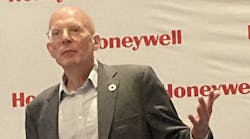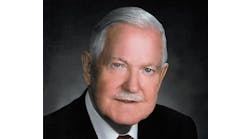To demonstrate some of its latest sustainability and digital transformation efforts, Honeywell UOP hosted its International Lab Tour on Sept. 12-14 at its facilities in suburban Chicago and Charlotte, N.C.
“Sustainability is the biggest challenge in the energy, transportation, food and other sectors. We all know we need to act, but no one can do it alone,” says Gavin Towler, chief sustainability officer at Honeywell. “Many companies are setting dates for net-zero emissions, and Honeywell is all about these transitions and supplying the technologies to help others be more sustainable.”
The tour kicked off with visits to one of Honeywell UOP’s oldest facilities—its 102-year-old Universal Oil Products R&D lab in Riverside-McCook, Ill., which has long pioneered, tested and produced catalysts and other innovative products for improving production of oil, gas, petrochemicals, plastics and chemicals. The venerable facility and its staff are now focusing on sustainable topics like renewable fuels and plastic circularity. The event continued at Honeywell UOP’s labs in Des Plaines, Ill., which is concentrating on improving batteries for energy storage, carbon capture, and hydrogen fuel sources. The tour concluded at Honeywell’s headquarters in Charlotte, N.C., where a roundtable of expert covered healthy buildings and smart cities.
“Everyone knows we make thermostats, but Honeywell is a data, systems, automation and software company that measures, analyzes and controls everything from process plants to airplanes to buildings, and now all of these facilities are looking at how to be sustainable, too,” adds Towler. “Since 2004, Honeywell has completed 6,300 sustainability projects, saved $110 million, and reduced the intensity of our greenhouse gas (GHG) emissions by more than 90%. This 20-year track record in our facilities enables us to provide our customers with a full portfolio of sustainability solutions.”
Towler adds that Honeywell’s path to carbon neutrality includes:
• Establishing its environmental, sustainability and governance (ESG) board;
• Reducing Scope 1 and 2 GHG emissions intensity by an additional 10% from 2018 levels, deploying at least 10 more renewable energy projects, and achieving certified compliance with ISO 50001’s energy management standard, all by 2024;
• Complying with Reducing Scope 1 and 2 emissions by 50% by 2030; and
• Committing to achieving carbon neutrality in Honeywell’s internal facilities by 2035.
“We’re committed to ESG principles,” says Towler, “And as we progress towards carbon neutrality by 2035, we want to help everyone else make the same transition.”





